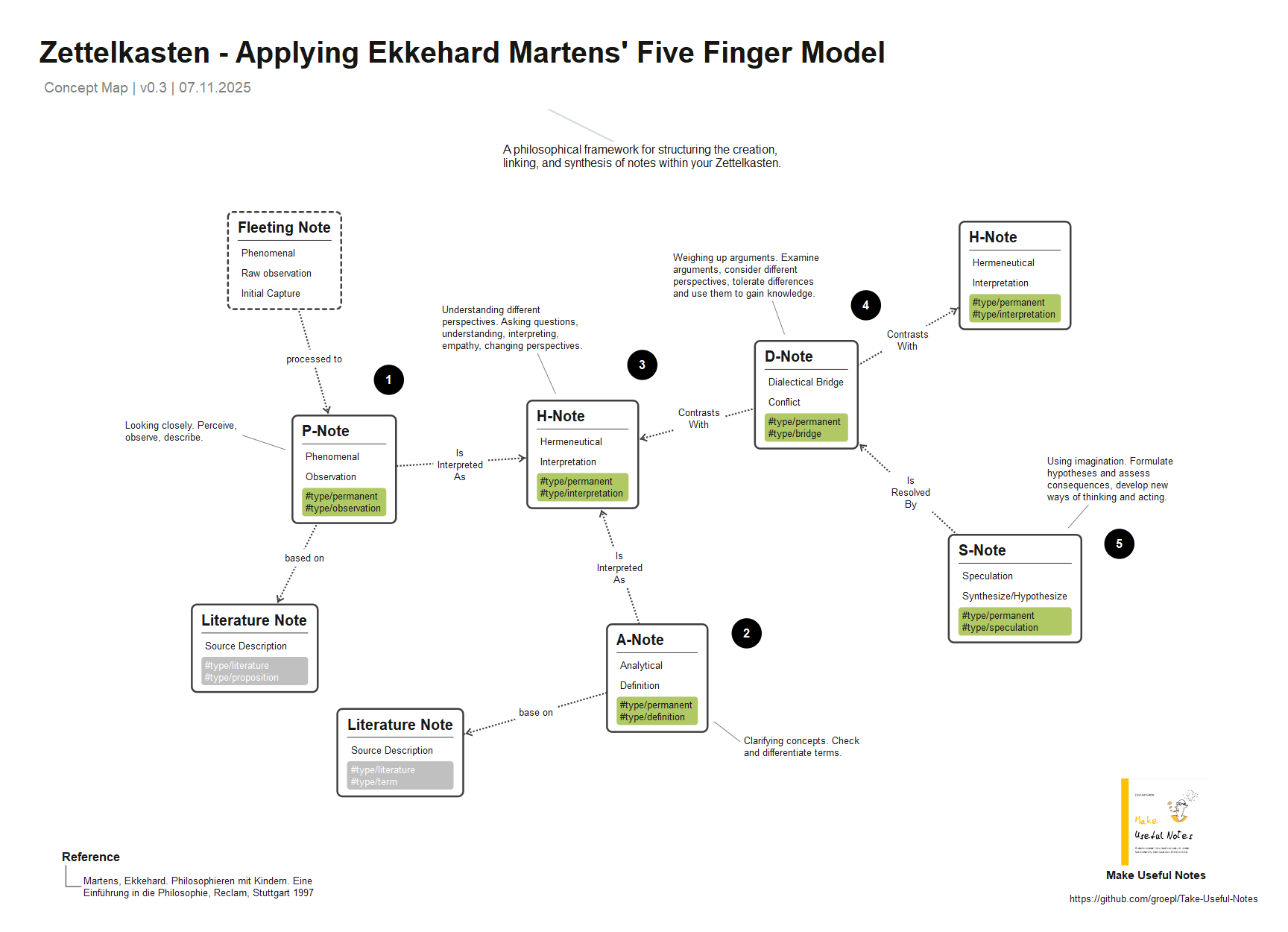Philosophical Tools for Zettelkasten
Today, I asked myself if there are any philosophical tools that could be useful for my Zettelkasten. Here's the result of my research:

I'm an engineer and a data scientist. Are there any philosophers on this forum who can prove whether Ekkehard Martens' Five-Finger Model works well in our context?
Post edited by Edmund on
Edmund Gröpl — 100% organic thinking. Less than 5% AI-generated ideas.
Howdy, Stranger!

Comments
Do you have access to the primary source? I could only find secondary sources.
It seems to me that this is not a philosophical tool, but a didactic tool to teach philosophical thinking. That doesn't mean that this is not useful in other contexts.
If I am correct that the leading model is a pedagogical model I feel that it might be a good tool to develop good thinking habits.
I am a Zettler
I also started with secondary sources. I have just ordered his book, though.
It's a tool designed for children. It may also be helpful for engineers. 😉
Edmund Gröpl — 100% organic thinking. Less than 5% AI-generated ideas.
For sure! I put this tool in the same category as the idea compass and added it to the collection of heuristics/checklists for exploring and working ideas.
I am a Zettler
The initial idea came from Ekkehard Martens' Five-Finger Model. Building on his five steps and adding two more, the Zettelkasten process seems to provide a framework for critical thinking and analytical reasoning, "The 7-Step Zettelkasten Cycle":
A simplified view on the model:
What are your first comments?
Edmund Gröpl — 100% organic thinking. Less than 5% AI-generated ideas.
Why are there several steps? You can't do everything at once. Each phase requires a different mental state.
So it's always a good idea to revisit old ones.
Edmund Gröpl — 100% organic thinking. Less than 5% AI-generated ideas.
Every framework must prove its usefulness. "The Minimalist's Zettelkasten" within "The 7-Step Zettelkasten Cycle" is one of my first applications:
More about: https://forum.zettelkasten.de/discussion/3356/looking-for-beta-readers-the-minimalist-s-zettelkasten-v0-14
Edmund Gröpl — 100% organic thinking. Less than 5% AI-generated ideas.
@Edmund said:
Your diagram reminds me of the compendium of design models by Dubberly Design Office in How Do You Design? A Compendium of Models (2005).
By the way, here's another interesting PDF from the same author: A Model of the Creative Process (2009). Both were previously mentioned in this discussion.
@Andy: Great sources. Thank you for sharing. Have you already applied these concepts to your Zettelkasten system?
Edmund Gröpl — 100% organic thinking. Less than 5% AI-generated ideas.
@Edmund said:
Insofar as I use my note system for creative/design projects, which I do, I've used design models with my note system, but I tend to think of a Zettelkasten as a tool that can be used within such a creative process, so I would phrase the question more like: Have you used a Zettelkasten in your creative system?
Of course, there is a system to using a Zettelkasten, and your diagram expresses well the intersection/overlap of a Zettelkasten system and a creative/design system.
We can easily use the "7-Steps Zettelkasten Cycle" as an analytical tool. Here I started to analyze my own contributions to forum Zettelkasten.de since May 2022:
The next step might be to show the number of views or comments for each post in the same structure. - And yes, these are some pretty crazy ideas from a data scientist! Sorry!
Edmund Gröpl — 100% organic thinking. Less than 5% AI-generated ideas.